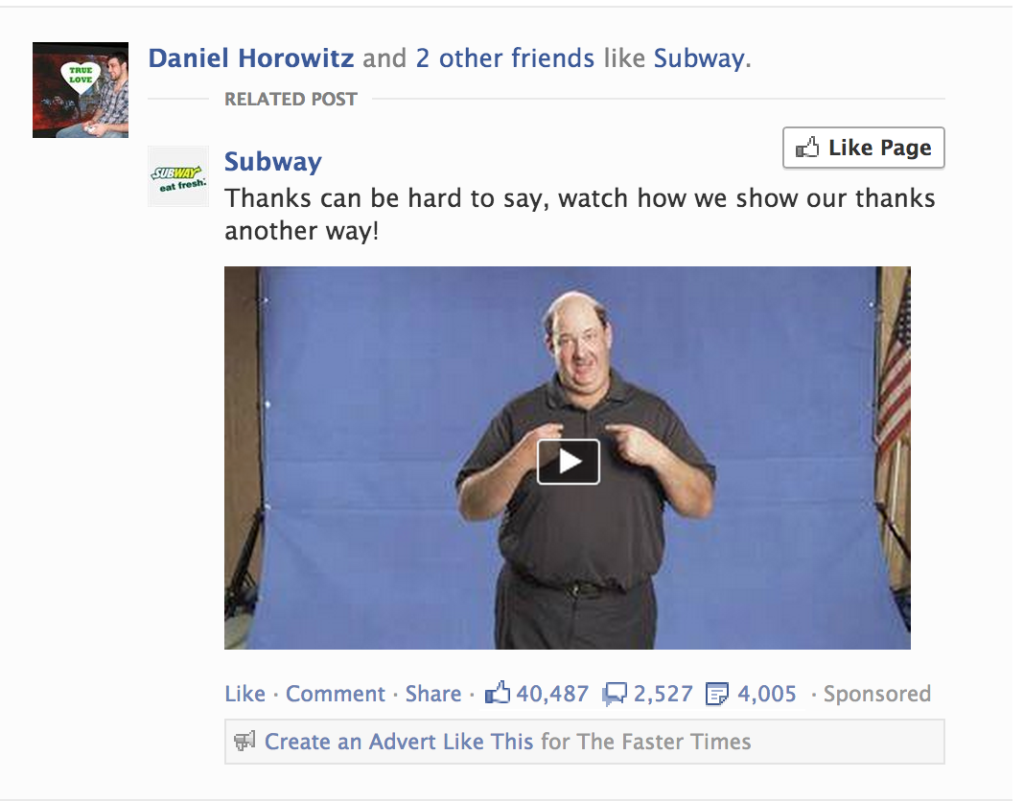Brands
Facebook’s Algorithm Change All Part Of Its Native Ad Master Plan
This week, the media world has been abuzz about Facebook’s early Christmas gift to publishers: Articles are being given a higher priority in its Newsfeed algorithm, and publishers are seeing a serious increase in traffic. According to Digiday, Business Insider President Julie Hansen said that Facebook referrals to the site increased a whopping 180% between August and October. The Buzzfeed network saw a 69% boost during that same period. And The Huffington Post said it’s seen “huge growth.”
It gets better: In an October blog post, Facebook reported that the “average referral traffic from Facebook to media sites has increased by over 170% throughout the past year. In fact, from September 2012 to September 2013, TIME’s referral traffic has increased 208%. BuzzFeed is up 855%. And Bleacher Report has increased 1081%.”
So what the Zuck is going on?
In a blog post on Monday, Facebook explained the change as a response to user preferences:
“Our surveys show that on average people prefer links to high quality articles about current events, their favorite sports team or shared interests, to the latest meme … This means that high quality articles you or others read may show up a bit more prominently in your News Feed, and meme photos may show up a bit less prominently.”
While that explanation is likely factual, there’s also the possibility of ulterior motives at play:
Facebook wants to dominate content distribution. (And, by proxy, paid content distribution.)
You have to imagine that it chafes Facebook that Twitter is often regarded as the premiere content-distribution platform when the numbers don’t back it up. As you can see in the graph below, Facebook absolutely crushes the competition — especially Twitter.
This isn’t just for pride. Content distribution is quickly becoming a very big business, as publishers like Buzzfeed continue to discover that effectively targeted “native ads” on social media platforms can set off a wildfire of social media traffic.
It goes to reason that publishers will likely spend money on those native ads on the platform that drives the most traffic. Facebook is winning there already, but with this change to the algorithm, it’s clear that they don’t just want to win. They want to obliterate the competition.
Already, Facebook has the best product for distributing content. Facebook’s Newsfeed Retargeting allows you to serve native ads in users’ Newsfeed, prominently promoting your piece of content. Better yet, you can target these ads to users based on their likes, interests, and browsing and search activity. Here are a couple native ads in my Newsfeed right now:
And:
(It’s true: I do love gadgets and sandwiches.)
As you can see, these native ads prominently display a piece of content, and like any other Facebook post, they can be liked, commented on and shared. When a Facebook user engages with a Newsfeed ad, the post spreads organically, appearing in the Newsfeeds of the friends of the users who engaged with that post. That means that — in a best case scenario — just a handful of paid impressions can turn into thousands of organic impressions, which is what makes Facebook Newsfeed Ads attractive to publishers of all kinds: publishers hoping to give their editorial a boost; publishers distributing sponsored content on behalf of brands; and brand publishers hoping to get eyeballs on their content.
With Facebook’s algorithm update, articles will spread even further via engagement. Now, when a friend comments on an article, that article will be more likely to resurface in the Newsfeed. It all points to one conclusion: Facebook is doubling down on content distribution.
It’s necessary. Right now, Facebook knows that Twitter is nipping at their heels. In late October, Twitter redesigned their site so that photos and videos automatically show up in the timeline, widely seen as a way to entice brands to prioritize the platform and purchase Promoted Tweets. And since this summer, Twitter has been rolling out Promoted Tweets with some of the same retargeting capabilities as Facebook’s ads.
With these algorithm changes, Facebook is clearly trying to stay ahead of the game.
Regardless of the reasons behind the algorithm change, though, this development is great news for publishers of all kinds. And with any luck, it’ll spark a referral traffic arms race amongst the biggest social platforms, with each doing everything they can to earn our dollars and affection.
The Content Strategist is our brand’s story. What’s yours? Let us help you find the answer.
Image by Kris Krug / Flickr.comGet better at your job right now.
Read our monthly newsletter to master content marketing. It’s made for marketers, creators, and everyone in between.







